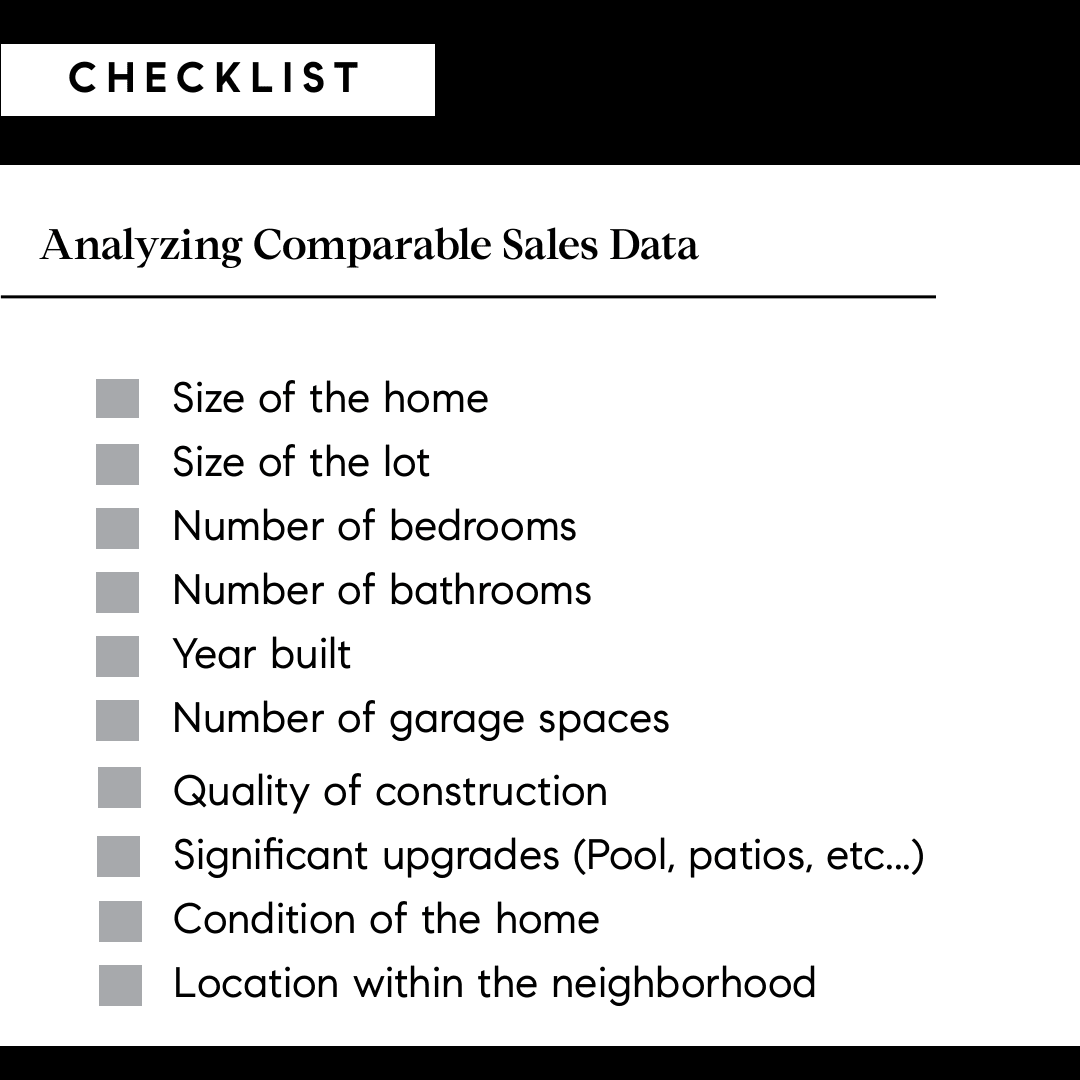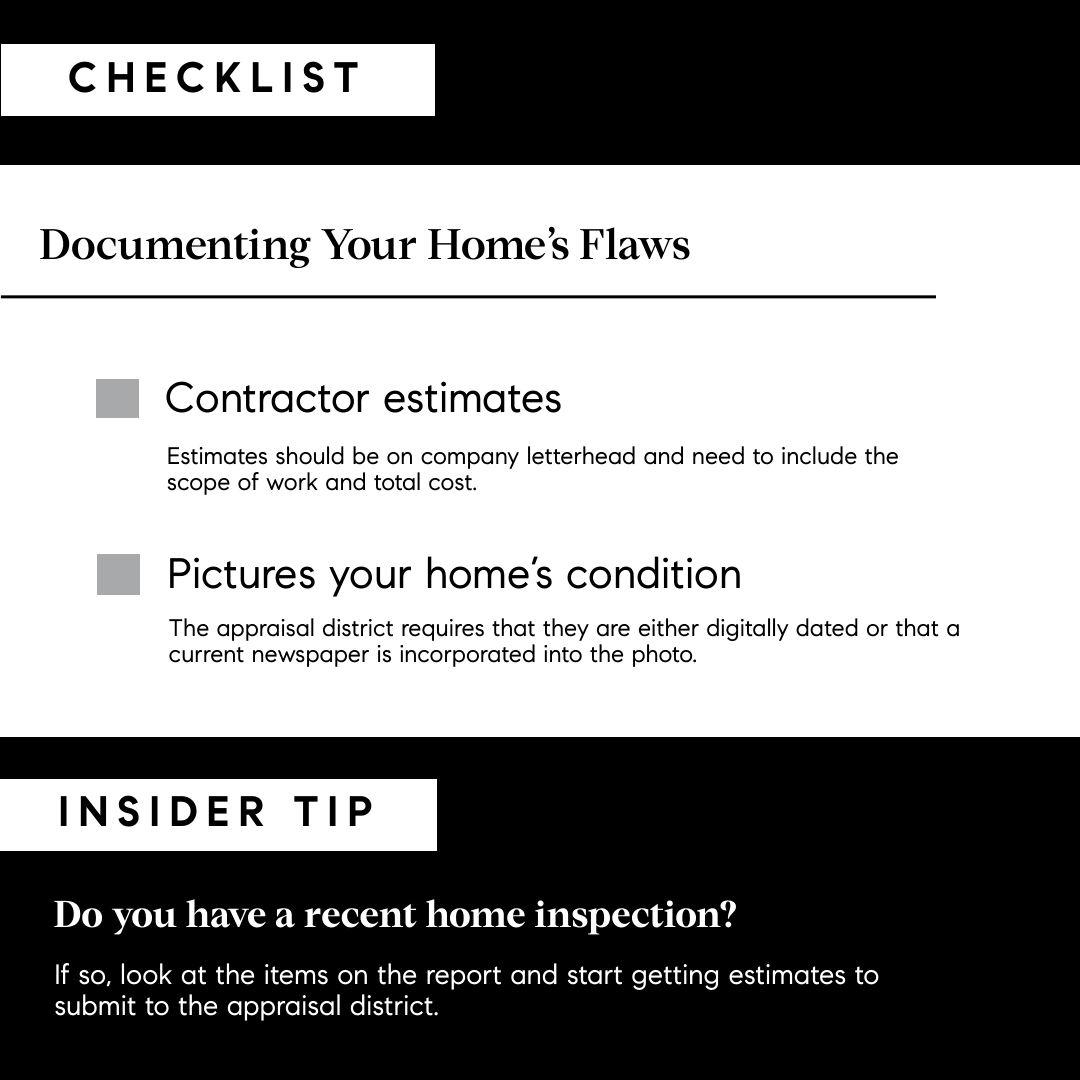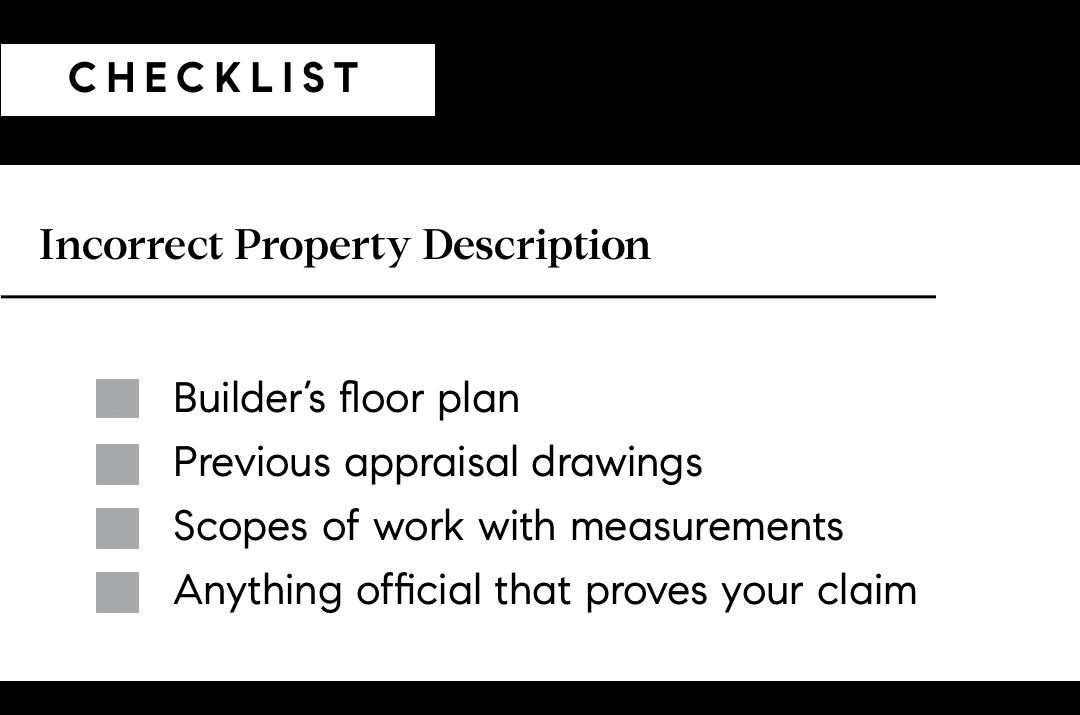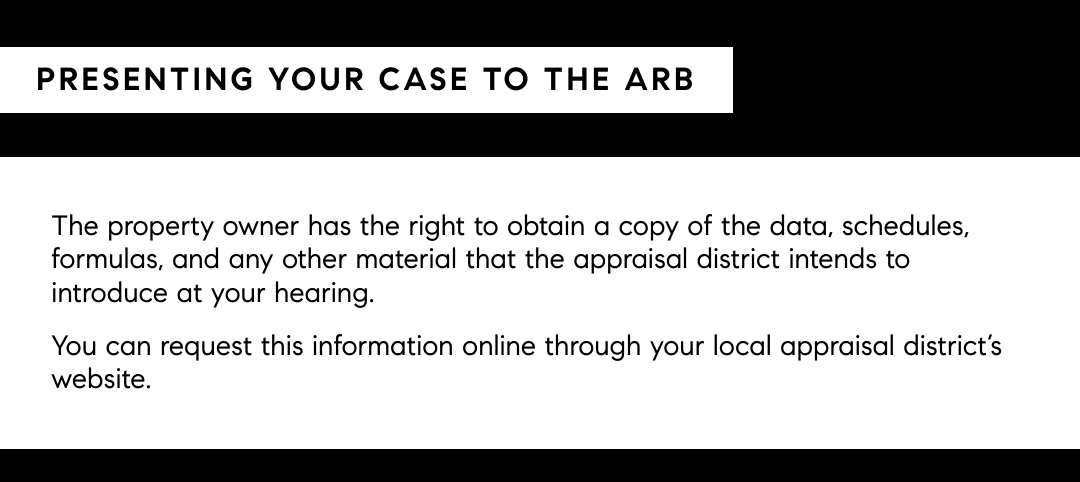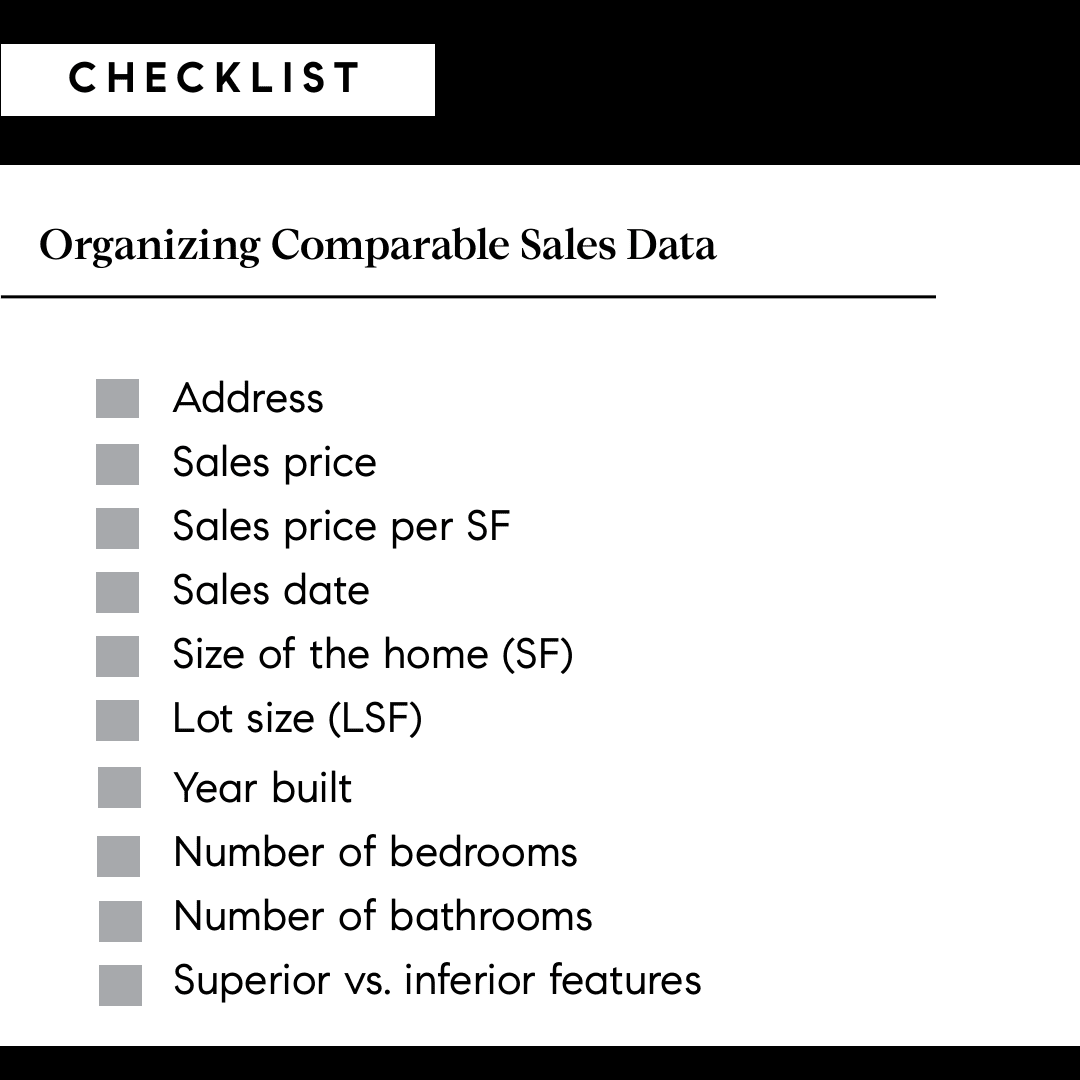Find It Fast
- A Realtor’s insider tips for homeowners protesting their property taxes in Fort Bend County and Harris County
- What is going on with Texas property taxes in 2023?
- Know Your Rights: Understanding the Basics
- Getting Down to Brass Tacks: Let's Talk Strategy
- Incorrect Appraised Value and/or Unequal Appraisal
- Gather Evidence: The Proof is in the Pudding
- What do I need to know when compiling and analyzing the comparable sold data?
- Explain and Document Your Home's Flaws
- Uniform and Equal Approach
- Is there any other documentation that could help me win my appeal?
- Are there any other factors that I can use to support my appeal?
- Prepare for the Hearing: Knowledge is Power
- The Takeaway
- Property Tax Resources
A Realtor’s insider tips for homeowners protesting their property taxes in Fort Bend County and Harris County
What is going on with Texas property taxes in 2023?
Home prices in the Katy, Fulshear, and Houston area markets are still at record highs! Rapidly rising interest rates did very little to lower home prices. The lack of supply, while slowly increasing, is still at record lows and is not enough to pump the breaks on buyer demand.
As area home prices climb, property taxes follow suit.
So, what can you do about it? Protest your property taxes. Let’s dive into the not so glamourous side of home ownership, shall we?
With home prices being as high as the appraisal district claims, protesting your taxes in 2023 is going to be an uphill battle. To tilt the odds in your favor, you need to utilize every possible strategy that applies.
The bulk of this blog post focuses on the strategies behind the often-overlooked ways that can help you win your appeal. Since I am sure what brought you here went something like this…
You opened your property appraisal and thought “Holy $@%!--Are they kidding?” Then as the sticker shock wore off, you made a more sober appraisal of your situation and thought, "What can I do about it and how do I win?"
Am I right?
Read on for a brief overview of the who, what, when, where, why of protesting your taxes, a detailed breakdown of the possible methods for supporting your appeal, evidence checklists for each method, and my top tips to give you an edge in this year's tax showdown.
DISCLAIMER:I am not a property tax expert! I’m a local Realtor that is passionate about adding value beyond the transaction by providing resources to help my clients navigate owning a home and to ensure that they are making informed decisions.
Know Your Rights: Understanding the Basics
Why is the county’s appraised value important?
The county’s assessed appraisal value of your property multiplied by your tax rate is what determines how much you are going to owe in property taxes. The value is based on what the county appraisal district says that your home could sell for as of January 1, 2023.
When is the deadline to protest my property’s assessed value?
The deadline to file your notice of protest in Texas is May 15, 2023 or 30 days after the notice of assessed value is mailed to you (whichever is later).
How do you protest property tax appraisals in Texas?
The first step to protesting your property taxes is to file your Property Owner’s Notice of Protest (Form 50-132) by the deadline.
File your notice by the deadline through one of the preferred ways listed on your appraisal district's website.
HERE is the information on filing an appeal with the Fort Bend County Appraisal District (FBCAD) and HERE is the information on how to file an appeal with the Harris County Appraisal District.
What do I need to know when completing the Property Owner’s Notice of Protest form?
When completing the Property Owner’s Notice of Protest Form make sure to carefully read the form and fully complete all applicable sections.
Pay close attention to the section titled Section 3: "Reasons for Protest". This section lists the options that you can use as the basis for your appeal. Make sure that you check ALL boxes that apply to your situation.
The boxes you check are crucial as your choices impact the type of evidence that you can present at your future hearings.
According to the Texas Comptroller’s Property Taxpayer Remedies, “
In the case of a typical residential property, checking incorrect appraised value and/or unequal appraisal will allow you to present the widest types of evidence and preserve your full appeal rights.” HERE is more information on
Property Taxpayer Remedies.
For a detailed guide on the
Texas Property Tax Basics, CLICK HERE. This 38-page guide from the Texas Comptroller explains each phase of the entire property tax cycle and the timelines of each phase: appraisal, equalization, assessment, and collection. It's not the most exciting read, but it is extremely informative.
Should I hire someone to protest my taxes on my behalf?
It’s time to decide whether you are going to hire a company that specializes in tax appeals or whether you want to go the DIY route.
My two cents: If you are thinking about hiring a company to appeal your taxes, this is the year to do it! Home prices are REALLY that high and despite what you may hear about the real estate market on the national stage, Katy, Fulshear, and Houston area home prices really did increase that much and are declining at a snail’s pace.
Most companies do not charge any upfront fees. Typically, there is only a fee involved if your appeal is successful. The fee is usually a percentage of the amount they saved you on your property tax bill. Just make sure to read the fine print!
Whether you decide to do it yourself or hire a company to do it for you, it is important to understand the process so you can make an informed decision.

Getting Down to Brass Tacks: Let's Talk Strategy
Perspective
If you take one thing from this article, it should be this...
The local appraisal district's appraisers have never set foot in your home, yet they're responsible for determining its "market value." They don't know the exact layout of your home and are clueless about your home's actual condition. Mind-blowing, right?
Guess what? The appraisal district is keenly aware of this and, believe it or not, they need your help with painting the picture.
Did you know that the homes that the appraisal district uses to determine your home’s market value were most likely primped and prepped to hit the market? We're talking about new appliances, a new HVAC system, replaced fences, and maybe even a brand-new roof. All these items increase the home’s market value.
Even the best kept homes can use a little love. Use the property tax protest process as a chance to take a closer look at what around your home needs to be repaired or replaced.
What significant upgrades does your home lack compared to the picture-perfect home down the street that just sold? What defective items does your home have that take away from its market value?
It’s time to shift your mindset about how much you love your home to what your home lacks in comparison to the shiny homes that were prepped to put on the market.
Now that you are thinking about it from that perspective, let’s break down the often-overlooked ways that can help you win your appeal!
Incorrect Appraised Value and/or Unequal Appraisal
How do the overall specs and condition of your home compare to the comps that the appraisal district is using to assess your home’s value?
You will want to support this claim using both of the following methods: analyzing comps (this is where I can help!), researching appraised values of similar homes, and documenting all the repairs your home needs.
Gather Evidence: The Proof is in the Pudding
To win your protest, you’ll need solid evidence. The more, the better. The evidence should be provided prior to or at your informal meeting.
What type of evidence do I need to support my protest?
The appraisal district defines your home's “market value” as the price at which your property would have sold for on the open market as of January 1, 2023.
The sales comparison approach is the most common method used to support your property tax appeal and is typically given strong consideration by the appraisal district. You will need information on the sales price, closing date, and pictures of comparable properties that have recently sold.
The appraisal district will also consider independent appraisals. Per the FBCAD 2023 ARB Informational Packet, comparable sales given on independent appraisals must have occurred within six months of January 1 in order to be considered. You can read more about their evidence guidelines
HERE.
What do I need to know when compiling and analyzing the comparable sold data?
- You will need at least THREE recently sold comps. While the appraisal district “legally” allows you to use comps that sold anytime in 2022, it prefers that you use comps that sold as close to January 1st as possible. Home values in Houston, Katy, and Fulshear hit ALL-TIME HIGHS during the summer of 2022, so this isn’t the year to try to back further than you have to. That said, it doesn’t hurt to look to ensure that you are considering all viable options.
- You need the MLS Full Agent Photo versions of each of the sold comps. This version includes all of the pictures of the home and additional information in the “Agent Remarks” section that may help provide more details on non-cosmetic updates of the home.
- They need to have the same classification as your home (I.e. single-family, townhouse/condo, etc…).
- Comps should be located in your same neighborhood and as close to your home as possible. For my Cross Creek Ranch clients (or anyone located in a neighborhood that is zoned to two different school districts), you should stick with homes that are located in your same school district.
- Pick the comps that mirror the specs of your home as much as possible. The appraisal district will make some adjustments if they need to, however, if there are available comps whose specs are more in line with your homes, they prefer to use those.
Explain and Document Your Home's Flaws
How does my home’s condition impact my property’s value?
When the appraisal district compares your cozy abode to that dazzling house down the street that just sold, be ready to point the differences out! Show them that the home they're comparing yours to was superior because of XYZ. In other words, be prepared to argue that their apples-to-oranges comparison simply doesn't add up!
What defective itemswould negatively impact your home’s value if you were to put your home on the market? The goal here is to devalue your home’s condition! Think livable vs sellable.
The condition of your home on January 1, 2023, is key. Any damage after this date won’t be factored into the taxable value of your home this year.
What types of evidence does the appraisal district need?
You need evidence to prove that your home needs the repairs that you are claiming and there needs to be a dollar value associated with each of the defective items.
Uniform and Equal Approach
Before we take a closer look at this approach, it is important to note that some appraisal districts will consider protests based on the Uniform and Equal Approach, while others have chosen to interpret this method differently.
In 2003 the property tax code was amended, allowing homeowners to lodge protests based on "a sensible quantity of suitably adjusted comparable properties." This means that you can protest by comparing your property’s assessment with the assessed value of a limited number of homes (the recommendation is 3 to 10 other homes).
To file a protest using this approach, gather information on the appraised values of similar homes in your neighborhood. This information is public record by going to the property search section of your local appraisal district's website.
Once you have gathered the values on the homes, you need to calculate the median level of assessment to figure out your homes assessed Uniform and Equal value.
Do this by calculating the median price per square foot of the comparable homes, then multiply that number by the size of your home. Make sure that you are doing all calculations on just the improved areas of the homes.
Is there any other documentation that could help me win my appeal?
Did you purchase your property or refinance it in 2022? If you purchased your home last year, you can submit your Closing Statement as evidence to lower your property value to, at least, your purchase price. If you refinanced, before interest rates went to $@%!, you could use the that your lender ordered as part of that process.
This should go without saying, but to clarify for those whose head is still spinning after opening your notice of appraised value…. Make sure that the purchase price shown on the additional documentation is less than your home’s current assessed value.
If the value is higher than your home’s current assessed value, you should not include your Closing Statement or as part of your evidence.
Are there any other factors that I can use to support my appeal?
Are all the exemptions that you qualify for accounted for?
Your Notice of Appraised Value that you received from the appraisal district has a list of all taxing units and your exemptions for each. Make sure that any exemptions that you filed are listed in this section.
What are the various exemptions and what do they have to do with my property’s taxable value?
An exemption removes “all or part of the property’s value from taxation, which lowers the tax bill”.
The most common exemption is the Residence Homestead Exemption. To qualify, you must own and occupy the home as your principal residence. This exemption prevents your home’s value from increasing by more than 10% per year.
There are a few exemptions to this rule. For example, you added a swimming pool or substantially increased the size of your home. If you have any exemptions, you may have noticed two different appraised values on your Notice of Appraised Value.
What is the difference between the market value and appraised value?
The market value is the total value that the appraisal district determined that your home is worth.
The appraised value is the amount that you are paying taxes on after your exemption caps are applied.
For a complete list of all of the available exemptions for Texas homeowners, CLICK HERE.
Are the details in the land and property improvements section of your tax property profile correct?
Unless your home was previously listed on the MLS, the appraisal districts don’t have an accurate way to determine your exact square footage, number of bedrooms, and number of bathrooms.
Search for your property on the appraisal district's website. Open the property record for your home and check to make sure the land and building/improved details are correct. This includes the following:
- Your home’s total SQFT
- The number of bedrooms
- The number of full and half bathrooms
- The number and SQFT of any outdoor patio areas
- The size of your pool and spa (if applicable)
- Your lot size and location (corner, cul-de-sac, etc….)
If the appraisal district shows that your home has more of any of these features, than it does, file a protest to have them correct the information. Depending on the item and how big of a discrepancy there is, this could result in assessed value reduction and in turn, lower your property taxes.
You will also need to submit the supporting documentation that backs up your claim.
If the property information is incorrect, should I file an appeal or let it lie?
It depends! In the last week alone, I’ve come across two examples of incorrect information in the property improvement section. Both were homes that were purchased directly from the builder and never listed in the MLS.
When running comps for one of my clients, I noticed that the appraisal district said their home was 450 SF larger than it is. That is a big discrepancy and one that should impact the home’s market value!
In this case, it would benefit you to have the appraisal district correct this information.
On the flip side, I have another client whose “property description” says that his home is 300 fewer square feet than it is, with only three bedrooms, and three full baths. In reality, his home has 5 bedrooms and has 4 full baths. I’m not going to tell you what to do here, but I think you can draw your own conclusion.
You can base your property protest on as many of the situations that apply to your home! I’ve outlined the most common methods and strategies above. However, there are several reasons that you can use to support your appeal. The complete list starts on page 23 of the Property Tax Basics from the Texas Comptroller.
Prepare for the Hearing: Knowledge is Power
Who has the burden of proof?
The burden of proof is on the appraisal district. Once you file your notice of protest, you are entitled to know exactly which homes they are comparing to yours. REQUEST this information! Then use that data to continue to make your case.
Prepare a summary with the information on your home next to the information about the other homes that the appraisal district used to determine the market value.
The Takeaway
This is NOT the year to file your Notice of Protest using only comparable sales to support your appeal.
Here are the TWO MOST IMPORTANT things that YOU MUST DO to help you win your appeal:
Document your home's flaws. Take inventory of all of the repairs that your home needs. Compile evidence to prove your home needs the repairs that you are claiming and put a dollar value (supported by contractor bids) on each of the items.
Request your evidence packet from the appraisal district. Once you file your Notice of Protest, you have the right to obtain a copy of all of the data, schedules, formulas, and any other evidence the appraisal district intends to introduce at your hearing. Once you receive that information, use their data and comps to disprove their case. FYI... The burden of proof is on the appraisal district.
Visit the resources section below for detailed information on what you need to know throughout each step of the property tax appeal process!
My goal is to be your resource for all matters of home and real estate in the Katy, Fulshear, and greater Houston areas. I am committed to helping buyers and sellers make informed decisions based on their unique circumstances and to helping homeowners maximize the full benefits of home ownership.
If you want to be the first to know about everything you need to know about protesting your property taxes in Fort Bend and Harris Counties, don't forget to sign up for our newsletter by
CLICKING HERE.
Don’t hesitate to contact me at 832.594.1265 or
[email protected] if you have any questions about buying a new home, selling your existing home, or need a resource to help you maximize the benefits of owning a home!
Property Tax Resources:
Texas Comptroller's Property Tax Assistance
Property Tax Payer Remedies
Texas Property Tax Basics
Texas Property Tax Exemptions
Fort Bend County Appraisal District's 2023 Information Packet

